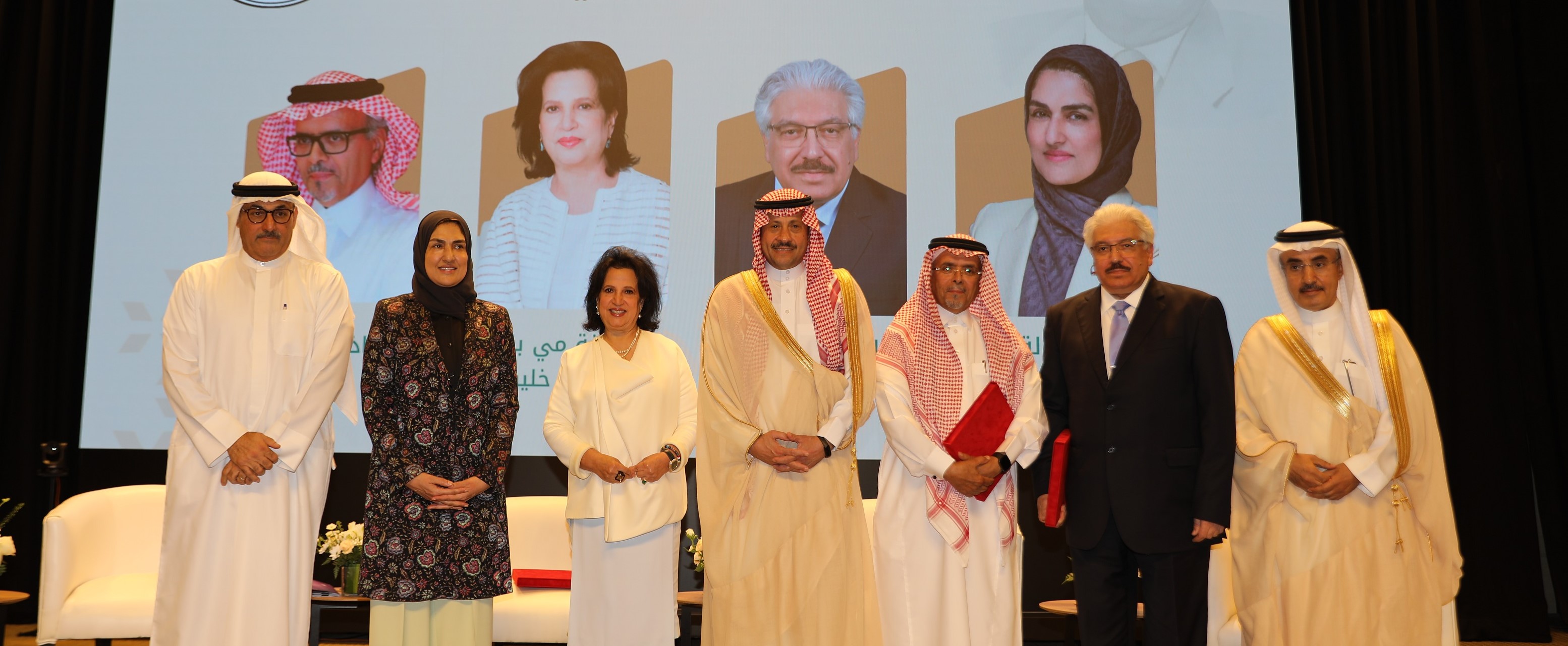
The Arabian Gulf University, in Partnership with the Saudi Embassy and the Al Ansari Centre, Celebrates the Legacy of Arab Intellectual Dr Mohammed Jaber Al Ansari
Arabian Gulf University
19 Sep, 2025
The Arabian Gulf University (AGU) organised an intellectual symposium celebrating the scholarly, intellectual and cultural contributions of the late Arab thinker Dr Mohammed Jaber Al Ansari, who, through his thought and writings, became a prominent figure in the trajectory of the modern Arab renaissance.
The symposium was held on Thursday morning at the Prince Abdulaziz bin Fahad Hall at the Princess Al Jawhara bint Ibrahim Al Ibrahim Centre for Molecular Medicine, Genetics and Inherited Disorders.
The event was attended by His Excellency Mr Naif bin Bandar Al Sudairi, Ambassador of the Kingdom of Saudi Arabia to the Kingdom of Bahrain, His Excellency Mr Ali bin Saleh Al Saleh, Chairman of the Shura Council, along with a distinguished group of intellectuals, media figures and interested attendees.
His Excellency Dr Saad bin Saud Al Fuhaid, President of the Arabian Gulf University, praised the distinguished scholarly standing of Dr Al Ansari, who was known for his rigorous critical approach and insightful analytical vision rooted in reality yet forward-looking. He commended his contributions during his tenure as Dean of the College of Graduate Studies at the university, stressing that his intellectual legacy remains a rich source for modern Arab thought and a reference for researchers across many fields of knowledge.
Dr Al Fuhaid emphasised that this symposium comes as part of the university’s ongoing mission to promote intellectual awareness and entrench culture within Gulf society, while renewing AGU’s commitment to honouring its pioneers who contributed to shaping its academic and cultural path.
For his part, the symposium moderator, Prof. Waleed Zubari, Dean of the College of Education, Administrative and Technical Sciences at AGU, stated that celebrating the journey of such a major Arab intellectual and esteemed professor as Dr Mohammed Jaber Al Ansari cannot be done justice in just a few hours. He noted that revisiting his intellectual and human legacy and hearing first-hand testimonies from those who knew him from different perspectives is not an easy task.
He further said: “Dr Al Ansari was not merely a thinker or an academic; he was a beacon that illuminated the paths of Arab thought for decades. A son of proud Muharraq and the founder of critical culture in the Gulf, he carried the name of Bahrain and the cause of the Arab nation together, leaving behind an intellectual and human legacy that will not be forgotten.”
The first speaker was Ms Hala Al Ansari, Advisor to His Majesty the King for Cultural and Scientific Affairs, who highlighted his human and familial side in a talk titled “In the Presence of Mohammed Jaber Al Ansari: A Journey of a Father, Academic and Intellectual”. She shared glimpses from her memories accompanying her father through various stages of his family and intellectual life, pointing to the values he embodied as a natural extension of what he expressed in his writings and intellectual positions.
She said: “Speaking about a father is very different from speaking about a thinker, but Dr Al Ansari was able to harmonise these two traits in his personality, blending the educational dimension with the cultural one. He instilled the same values he believed in within the family as he did in classrooms,” affirming that his intellectual legacy will remain alive in the cultural memory for representing an enlightening vision that contributed to shaping Gulf unity and modern Arab consciousness.
This was followed by a talk from Prof. Riyad Yousif Hamzah, President of the Royal University for Women, titled “The Long Road with Dr Mohammed Jaber Al Ansari”. He reviewed the friendship and collegial bond he had with the late Dr Al Ansari for over a quarter of a century, highlighting his efforts to translate a significant part of Dr Al Ansari’s intellectual works into English, enabling non-Arabic readers to access this humanistic thought and to understand the nature of Arab identity and perspectives on events, history and interrelations.
He also shed light on Dr Al Ansari’s relationship with his students at the Arabian Gulf University and how they were influenced by his teaching approach, which presented Arab-Islamic culture and civilisation in an open manner not confined to a single book or a single instructor, thereby enriching the material and encouraging continuous reflection on issues and linking the humanities with applied sciences in their lives.
Her Excellency Shaikha Mai bint Mohammed Al Khalifa, Chairperson of the Board of Trustees of the Shaikh Ebrahim bin Mohammed Al Khalifa Centre for Culture and Research, then delivered a talk titled “A Tale of Thought and Memory: Dr Al Ansari as I Knew Him and as My Father and Grandfather Knew Him”. She recounted the relationship that connected her father and grandfather with Dr Al Ansari and his efforts in helping to establish the Shaikh Ebrahim bin Mohammed Al Khalifa Centre for Culture and Research.
She stressed that Dr Al Ansari was among the first to write, compile and edit works on Bahraini and Arab history, and that he played an active role in spreading knowledge with dedication and sincerity. She also shared excerpts from an old draft letter she found in her father’s library that reflected the personal and human aspect of his close relationship with her family, serving as clear evidence of his commitment to knowledge and scholarship.
The symposium concluded with a critical reflective address by Saudi critic and intellectual Prof. Dr Saad Al Bazei, titled “Dr Al Ansari’s Pan-Arab Thought: A Reading of His Journey and Role as an Arab Intellectual”. He presented the late Dr Al Ansari’s journey as a man who illuminated the paths of knowledge and wisdom for many in the context of contemporary Arab intellectual movements, citing milestones of his intellectual contributions and civilisational dialogue that transcended borders, and pointing to the distinctive features that set his approach apart from other Arab nationalist intellectuals.
